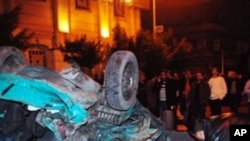Eyewitnesses say at least 21 people have been killed and scores wounded in a suicide bombing attack at a Coptic church in Alexandria, Egypt. Tensions between Christians and Muslims have been on the rise in Egypt and nearby Iraq following recent threats by the al-Qaida terrorist group. Edward Yeranian reports from Cairo.
Firemen worked to douse the flames from several blazing vehicles following an explosion outside the All Saints Coptic church in the Egyptian port city of Alexandria. The explosion occurred shortly after midnight as worshippers began leaving a New Year's eve mass at the church.
A heavyset middle aged man who was burned across his face says that as he was leaving the church he felt a massive explosion. He says he was dazed by the force of the blast.
The Egyptian Interior Ministry issued a statement saying the explosion was caused by a suicide bomber and that forensic tests indicate the materials used in the explosion were homemade. The statement added that initial reports of a carbomb were incorrect.
Deputy Interior Minister Nashat Hilaly urged Egyptians to unite in the wake of the blast:
Hilaly says that explosions like this happen in many countries across the world. He adds that the important thing now is that Egyptians of all religions unite, following the explosion, to prevent any further acts of violence.
Eyewitnesses say angry Coptic Christians tried to attack a mosque across from the church after the explosion and that fights broke out, causing more casualties. Al-Arabiya TV showed a crowd of mostly young Coptic men waving their fists in the air as police intervened.
The local television news channel Nile News reported that despite the angry reactions of many, dozens of ordinary Egyptians rushed to area hospitals to donate blood to help victims of the explosion.
Egyptian President Hosni Mubarak immediately condemned the explosion and called on Egyptians to avoid further sectarian strife. A spokesman for Egypt's al-Azhar University, Mohammed Tahtawi, stated that the explosion was not in the interest of Muslims:
He says that this act is against Islam, it is illogical, and unpatriotic. He insists that Muslims are responsible for protecting churches and that this kind of sectarian act is against the interests of Muslims. He calls the act a crime but notes there were also Muslim victims. He argues that Egyptians are one people and this type of act must stop immediately.
Former UN Secretary General Boutros Boutros Ghali also condemned the explosion. He told Egyptian TV that this type of explosion takes place regularly in Pakistan, Afghanistan and Iraq, but is not a normal event in Egypt. He said such acts must not be allowed to proliferate.
Said Sadek, who teaches political science at the American University of Cairo, argues that the danger of the explosion is that it could set off further sectarian violence between Muslims and Christians:
"Alexandria has been a bastion of the Muslim brotherhood and there is a lot of extremism in Alexandria anyway and so we saw the reaction afterwards," he said. "You saw attacks by the Copts at a nearby mosque because they felt maybe the Muslims are happy with what happened and so they made their attack and then the Muslims attacked back. So the real alarm is the reaction afterwards from the people in the area."
Sadek points out that many of the underlying sectarian conflicts in Egypt, including building churches, freedom of religion, and conversions between one faith and another are difficult to resolve. "No one is addressing these problems," he notes, "because there are no easy solutions."




